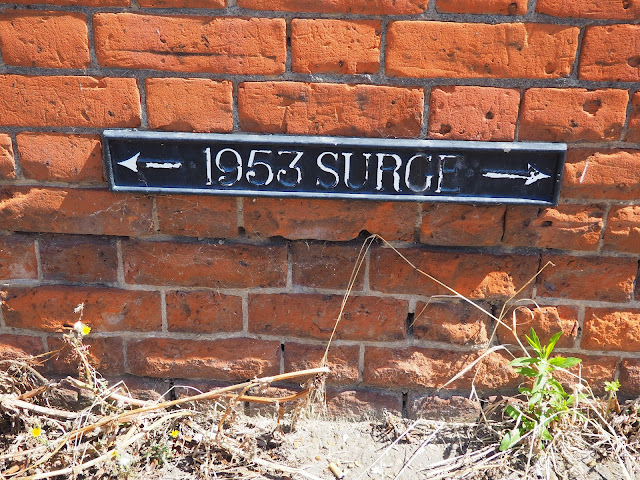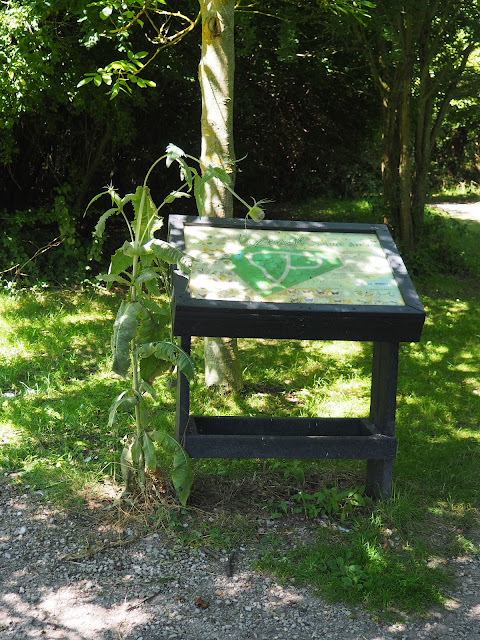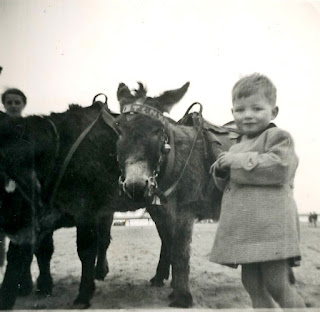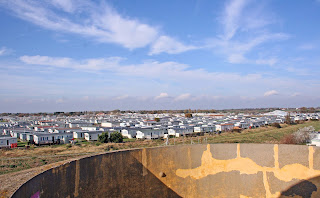And speaking of melancholy, there was a moment (rather a long time ago now) when I considered writing a book to be titled “The Seaside In Winter.” The idea was that I’d buy a VW camper and spend the three months of the British winter going around the coast, walking through all the deserted, windswept, out of season holiday resorts, waxing lyrical about the pleasures of abandonment, savoring the bleakness, the loneliness, the intense melancholy that would only end with the arrival of spring. Unless of course I ended it somewhat sooner than that, by my own hand, because I couldn’t stand it anymore, and I’d be found slumped over the wheel of the van, in a parking lot next to some rotting rollercoaster. I could see how this would make for a very satisfying last chapter (presumably written by someone else).
Part of the idea was that these seaside resorts, which in the summer are dedicated to leisure and fun, would in the winter reveal their true dark, depressing, despairing nature. And of course, I would probably have argued that this dark, depressing, despairing nature actually shows through pretty well even in the very middle of summer.
Well the book was just another one of those great tomes that never got written. And these days I think it was probably good for my mental health that I never even attempted the project.
My family apparently believed in the seaside. As I grew up there were day trips to Skegness, Bridlington, Cleethorpes, then weeks away in Bognor, Great Yarmouth, even Newquay. In retrospect I don’t know why my parents bothered. They never seemed to enjoy themselves very much, and in consequence I enjoyed myself even less. There was also always the suggestion that they’d come all this way, put in all this effort, just for me; which made the whole thing complete torture.
I think one of the problems was that my parents weren’t great doers. They didn’t like to do much of anything, and certainly not the kind of things that people typically do at the seaside, whether it be swimming or going on the Ferris wheel, visiting zoos or fun houses or playing crazy golf. Mostly, as I recall, we just walked up and down the prom, often with my mother complaining there was nothing to do except walk up and down the prom.
I have in fact inherited some of this tendency not to want to do things, though I have fought hard against it. (You want a round of crazy golf? Sure, you bet!) But maybe it’s part of what turned me into a writer – into an observer rather than a participant. What I do have, which my parents seemed not to, is the ability to take pleasure in small things: I’m more than happy simply to walk up and down the prom. This is my idea of something to do rather than nothing.
When I stopped going on holiday with my parents they continued to go away to the seaside and I would receive sad postcards, such as the one below, that made me even more glad not to be on holiday with them.
Martin Parr’s book Boring Postcards beautifully captures the agony of the English at play: grey seaside gardens, boating lakes, caravan sites that look like internment camps. Of course it’s laughable that people would think these were places where you might have fun, but the heartbreaking thing is that at the time we knew no better place to go to have fun.
Since I now live in LA, I supposedly have easy access to the ocean: Santa Monica and the Pacific are just 15 miles away, although on the wrong afternoon it can take considerably longer to drive to Santa Monica than it used to take my dad to drive us to Skegness. But sometimes I do go to the California coast for a day or a weekend, to Huntingdon Beach perhaps where this picture was taken:
I kid you not, this is a photograph I took myself, it isn’t a postcard. I actually saw these two people as I was walking on the pier at sunset and it really, really did look that. Perhaps you would expect nothing else from California, and I’m certainly not going to complain about the “picture postcard” aspect of it, but the fact is, at moments like that I actually experience a profound, nostalgic longing for the bleak English seaside. You bet I do. And when I’m back in England it seems to have become a habit to visit some more or less windswept bit of the Essex coast: Canvey Island, Southend, and on my last trip Jaywick.
People have been telling me about Jaywick for years, describing it as weird, gloomy, vaguely threatening, all the things I love. The place was built in the 1930s as a holiday resort for London’s Eastenders, but according to a recent survey, with the title “Indices of Multiple Deprivation 2010,” Jaywick is now the most deprived place in England. Of course you can judge these things in various ways. The survey used statistics for income, employment, health, disability, crime and living standards; and no doubt the place is full of poor, sick unemployed people. Even so, if the vast numbers of caravans are any indicator, a lot of people still want to be there, at least for part of the year.
I always find caravan sites gloomily appealing, but in Jaywick it’s the houses that are truly compelling. Partly it’s their smallness. Some of them are absolutely minute, built as holiday chalets, as places where you didn’t do much more than sleep. Now people live in them full time. And some of the dwellings do show signs of desperate living, houses that have been smashed up, in some cases burned out. On the other hand there’s plenty of evidence of house-proud owners keeping up their homes and gardens in beautifully eccentric ways. In some cases you can find examples of the two elements right next to each other, which admittedly must be tough on the house-proud. The received wisdom is that the house wreckers will eventually prevail, but I wouldn’t give up all hope.
The beach and the air seemed clean enough, there’s the promise of “renewal,” and there was even an art exhibition in the Martello tower. And sure there were some dodgy characters walking the streets: a word to the wise, if you want to keep up a veneer of respectability do not walk down the street with a can of lager in your hand and stop to rifle through every litter bin you pass. But I don’t know that the Jaywick guys looked any dodgier that the ones I see every time I walk along Hollywood Boulevard.
If I ended up living in Jaywick I certainly wouldn’t think my life was a disaster. And the fact is, a lot of people do end up living at the seaside one way or another. Which brings me, a tad free-associatively, to Aleistair Crowley, who ended up, not in Jaywick, but in Hastings for the last two years of his life, keeping up a surprising thick veneer of respectability. Iain Sinclair, of course, has a place in Hastings now too.
I must say that to the limited extent I ever think about Crowley at all, I never imagined him as much of a walker. And yet here he is in Chapter 67 of his Confessions: “When one walks, one is brought into touch first of all with the essential relations between one's physical powers and the character of the country; one is compelled to see it as its natives do. Then every man one meets is an individual. One is no longer regarded by the whole population as an unapproachable and uninteresting animal to be cheated and robbed. One makes contact at every point with every stranger.” Whether one actually wants to make contact at every point with every stranger, in Jaywick or on Hollywood Boulevard, or in fact anywhere else, remains open to debate.
























